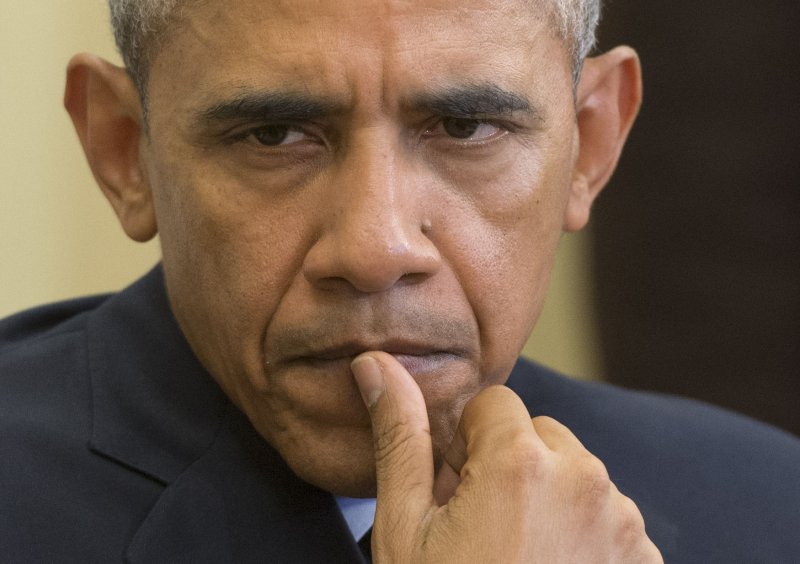1 of 2 | When President Barack Obama took office seven years ago, he inherited the worst hand of any chief executive since Franklin Roosevelt. Where the world may be headed could give the next president, an equally disturbing hand. Photo by Kevin Dietsch/UPI |
License Photo
Nearly two years and a century ago, the assassination of Archduke Franz Ferdinand and his pregnant wife, Sophie, in Sarajevo precipitated World War I. Today, a rapid transit across the geostrategic and geoeconomic landscapes of the 21st century in seven league boots can lead to an equally pessimistic assessment.
No one is projecting World War III. Yet, to quote Dickens, this is far from "the best of times."
In the United States, the presidential campaigns of both parties reek of farce, not fact or substance. That a TV celebrity and a Democratic socialist are leading candidates defies imagination. Global stock markets are in potential freefall as China's economy and bourses smack of bubbles. The Dow and NASDAQ are down more than 15 percent with no bottom in sight.
The Middle East and Persian Gulf are in chaos. Iraq, Syria, Libya and Yemen are mired in civil war. Saudi Arabia requires major economic reform and a drastic curtailment of its Wahabi elements exporting radical Islam. Both are unlikely. As a result, and that Saudi Arabia does not regard the Islamic State as existential and dangerous as the United States does is not conducive to a successful outcome.
Iran is caught between pragmatists and revolutionaries. The bulk of Persian youth is inclined toward modernism. Yet the old guard holds to its extremist views. Given Saudi Arabia's execution of a leading Shia cleric and the spat that has caused the removal of ambassadors, the Arab-Persian schism is growing larger not smaller and is playing out in Iraq, Syria and Yemen, often through surrogates' war.
Russia's economy continues to plunge. President Vladimir Putin is implicitly accused of acceding to the murder of a former KGB defector turned MI6 consultant in London nearly a decade ago. That has not helped UK-Russian relations. Still, one can wonder why the United States assassinated a U.S. citizen who became an al Qaida warlord without due process has not gained equal prominence. What Russia's aims are in Ukraine, or for that matter Syria, remain opaque. And the West is justifiably uncertain about Putin's intentions.
When President Barack Obama took office seven years ago, he inherited the worst hand of any chief executive since Franklin Roosevelt. Unfortunately, where the world may be headed could give the next president, an equally disturbing hand when he or she enters office in a year's time. The irony is, however, that a large bet could be won in 2017 over public longing for the Obama presidency given that his replacement, if the current roster of candidates is not expanded, will not be up to the demands of that office.
As Lenin asked, what can be done? Big ideas are essential. That any ideas, no matter how common-sensical, are adopted rests in the laps of the unpredictable political gods and the whims of American politics.
The first thing Obama must do, seven years too late, is to convene a principals-only meeting at Camp David with the leaders of both parties in Congress. The speaker, majority and minority leaders of the House and the majority and minority leaders of the Senate, along with a few distinguished members of both bodies, should be convened for at least a long weekend. The aim is to gain agreement on key issues that pertain to economic, physical and international security.
Establishing a national infrastructure bank; sorting out entitlements; fixing healthcare; altering the tax code; and agreeing to a sensible national security program are vital steps. And the group should be convened for as long as it takes to reach agreement.
Second, there needs to be a negotiation with Moscow over defusing tensions and reaching solutions in Ukraine, Syria and, of course, Europe. The best forum would be the P5 plus two—the permanent members of the UN Security Council, the European Union and NATO rather than just trying to engage NATO, which does not have a broad enough political mandate to gain accommodation with Russia.
Finally, NATO must take a larger role in the Middle East and Persian Gulf to field a competent Arab/Islamic fighting force against IS. Allied Command Transformation, one of NATO's two strategic commands stationed in Norfolk, Va., would be ideal to lead this effort as training is one of the command's key responsibilities.
Will this happen? Probably not. As a result, the catastrophe of June 1914 looms large. There will not be a world war. But chaos and disruption from stock markets to failed and failing states will accelerate. Will anyone listen? Probably not.
_________________________________________________________________
Harlan Ullman is UPI's Arnaud de Borchgrave distinguished columnist; chairman of the Killowen Group that advises leaders of government and business; and senior adviser at Washington, D.C.'s Atlantic Council and Business Executives for National Security. His latest book is "A Handful of Bullets: How the Murder of Archduke Franz Ferdinand Still Menaces the Peace."















